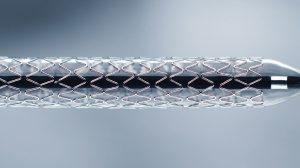NEW YORK (Reuters Health) – Adding angioplasty to medical therapy does not improve the outcomes of patients with renal-artery stenosis and carries substantial risks, according to a report in The New England Journal of Medicine for November 12.
The findings indicate that patients treated with angioplasty were comparable to controls in terms of renal events (73 vs. 80), cardiovascular events (238 vs. 244), and deaths (103 vs. 106) over a median follow-up of 34 months.
Previous randomized trials had shown no significant benefit for angioplasty over medical therapy alone, but the studies were small and may have been unable to detect some clinically relevant differences, Dr. Keith Wheatley, from the University of Birmingham, UK, and colleagues note.
The Angioplasty and Stenting for Renal Artery Lesions (ASTRAL) trial featured 806 patients with atherosclerotic renovascular disease who were randomized to receive medical therapy with or without angioplasty. Angioplasty was performed with or without stenting at the local practitioner’s discretion, and no renal protection devices were used.
Renal impairment progressed more slowly in the angioplasty group than in controls, and angioplasty patients also had lower mean serum creatinine levels (lower by 1.6 micromol/L), the researchers report. These apparent benefits, however, did not translate into meaningful improvements in clinical outcomes, as the similar rates of mortality and renal and cardiovascular events show.
Systolic blood pressure decreased to a similar extent in both groups during follow-up. Diastolic blood pressure, by contrast, decreased to a greater extent in the medical therapy-only group (p = 0.03).
Serious complications occurred in 23 angioplasty-treated patients, including 3 amputations of toes or limbs and 2 deaths, the authors note.
The authors were unable to identify any patient subgroup that might benefit from angioplasty over medical therapy alone.
“The overall results of a large trial may disguise a worthwhile clinical benefit in smaller subpopulations of patients,” they note. “However, we found no evidence that the effect of revascularization differed among patients with varying degrees of renal disease, with the serum creatinine level, estimated glomerular filtration rate, severity of stenosis, and renal length as variables.”
Reference:
N Engl J Med 2009;361:1953-1962.




